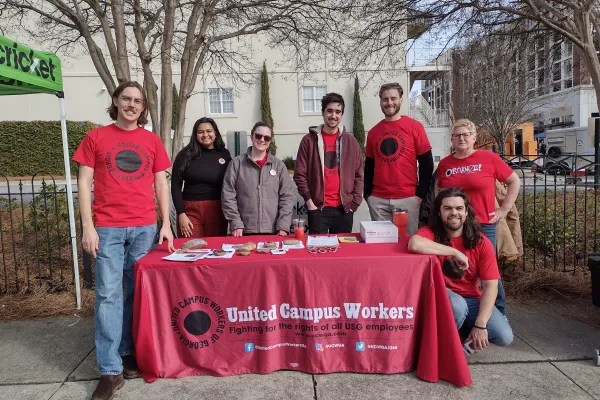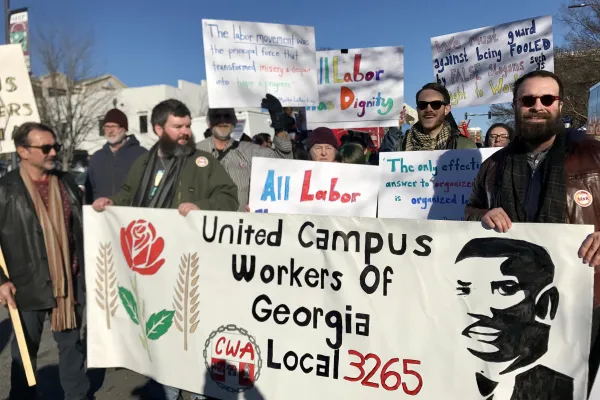At Risk, All Day, Every Day
The following essay by UCWGA member David Nickel appeared in the August 27 edition of The Chronicle of Higher Eduction.
As a worker in facilities at the University of Georgia, I don’t feel safe here. Since March I have seen and heard — and have myself been the victim of — a pattern of poor leadership, an absence of transparency, and a general lack of basic empathy from facilities management.
At this point management is not informing individual shops of positive cases, nor is it telling us if people are out because they were directly exposed to the virus. There are people in my shop who flaunt the fact that they refuse to wear a mask. Do they face any repercussions? No. I, however, have been targeted and harassed for voicing my concerns about safety on campus. I feel at risk all day, everyday — and I’m punished for saying so.
Facilities management has stated that, even if you know for sure that you have been exposed to Covid-19, you should not self-quarantine or get tested unless you show symptoms. The “logic” of this policy goes against everything we know about Covid-19, and it’s dangerous. This is negligence, plain and simple.
Not only do these lackluster protocols for dealing with the crisis show the full scope of the university facilities’ lack of a comprehensive plan to keep us and everyone else on campus safe; they also peel back the Band-Aid that has been covering up an advanced state of bureaucratic rot. Nearly every shop in the facilities system is understaffed, and has been for some time. Yet the management structure gets more bloated by the year. This has left those at the top completely disconnected from day-to-day operations, and woefully out of touch with those they pretend to manage. This is a major problem for the present and future of our side of the higher-ed work force.
But the crisis has also given rise to unexpectedly positive developments for the university as a whole. I have been a member of the United Campus Workers UGA chapter for more than two years. The chapter is a “wall to wall” union, which means that our membership is open to anyone who receives a paycheck from the University System of Georgia, from facilities and clerical staffers to faculty members and graduate students. While our segments of the campus work force don’t always face the same struggles or share aspirations, this pandemic has made us brothers and sisters in arms, a bulkhead against an institution that cannot even connect with staff and faculty members anymore with a straight face.
Staff, faculty, graduate students — all of us are weathering this pandemic the best we can. We have formed an alliance against systemic wage discrimination. We have held strong under pressures we did not know we could withstand, pressures from the administration and from forces outside the university. And above all, we have formed the kind of bonds and friendships that have made all that possible.
These newfound bonds will continue long after this crisis is over. Georgia may be a “right to work” state, and it’s true (to some extent) that unions are perceived as not having much influence here, but no one can deny that our strength in numbers, solidarity, and resolve has led to recent changes on campus. We will have our seat at the table. It’s only a matter of time.
David Nickel works in the University of Georgia Facilities Management Division.
UCWGA Endorses the CWA Executive Board's Statement on the War in Gaza
GGC Faculty Vote No Confidence in President Jann Joseph and Provost George Low


